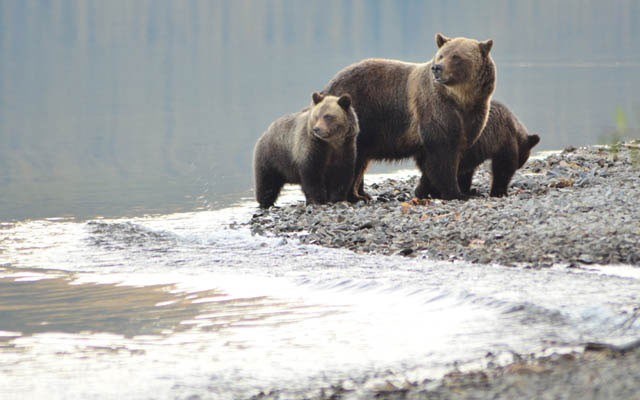A local biologist is asking regional leaders to vote against issuing permits for Innergex's Upper Lillooet River Hydro Project, saying it will cause "significant and irreversible harm" to the area's endangered grizzly bear population.
In a letter to Squamish-Lillooet Regional District (SLRD) directors dated March 13, bear biologist Wayne McCrory, of McCrory Wildlife Service Ltd., asked officials to send a message to the B.C. government by voting against the granting of Temporary Use Permits (TUP) for the run-of-river project.
McCrory was asked by an interested party to review the potential effects of the hydro project on grizzly bears in the area, and said more consideration is needed of the cumulative impacts of the Innergex project and other industrial work in the region on the existing population.
"It is all too easy to focus on just the impact of the footprint of an industrial project and not on how incremental it can be to sensitive species like the grizzly bear when joined to other impacts that already have affected their population viability," he wrote, pointing to other river diversion projects in the area, a proposed LNG plant in Squamish and a gold and copper mine near Fish Lake that was rejected by the federal government for a second time last month. Taseko Mines intends to reapply again.
McCrory said there are four threatened Grizzly Bear Population Units (GBPU) in the region: an estimated 58 bears in the Squamish-Lillooet area; two in the Garibaldi-Pitt area; 203 in the South Chilcotin and 23 in the Stein-Nahatlatch area. The review also led to his discovery that the surviving grizzlies in B.C.'s South Coast Mountains are the last left in North America of the dry-land salmon bear ecotype.
The biologist also reserved some of his criticism for the provincial government, saying it has continued to "completely mismanage our wildlife, wild rivers and forests, as evidenced by its approval of the (Upper Lillooet River Hydro Project) in the face of how few grizzly bears remain in the South Coastal Mountains."
The B.C. government was given a paltry grade earlier this month in a peer-reviewed study by the David Suzuki Foundation, saying the province has failed to implement many of the measures aimed at protecting grizzly bears that were first set out in a management plan from 1995.
"The B.C. government's failure to manage grizzly bears effectively under its own policies is having disastrous consequences for the health of the species," read an overview of the study published on www.davidsuzuki.org. "Nine sub-populations are now on the verge of extinction, and scientists maintain that the government's controversial trophy hunt is leading to widespread over-killing of bears."
For project proponents Innergex, many of the concerns over grizzly bears voiced by McCrory have been heard before.
In a 2012 letter to the B.C. Minister of Environment and the Minister of Energy, Mines and Natural Gas, representatives from a number of environmental organizations, including the Association of Whistler Area Residents for the Environment and the Pemberton Wildlife Association, outlined their issues with the project, which included the potential threats to grizzly bears and other wildlife.
As the proponent did at the time of the letter, Innergex's director of public affairs Bas Brusche pointed to the province's environmental assessment of the project as proof of the energy company's commitment to mitigating potential impacts on grizzly bears.
"That environmental assessment has been concluded with positive results for the project, also stating there would be minimal impacts on grizzly bears if we stick to all the conditions attached to the project," he said.
Among the conditions imposed on Innergex, Brusche explained, is ensuring that grizzly foraging areas are avoided; that construction be limited, or in some cases prohibited, during times that bears are foraging, or when salmon are spawning; and that screening be erected at several sites where interaction with grizzlies is most likely. Innergex also must revegitate any areas where berries have been removed, and workers will undergo special bear training, Brusche added.
In September, it was announced that the independent power firm would contribute $300,000 to cover some of the costs associated with a five-year study into the grizzly population living near the proposed project. Innergex was obligated to do so by the B.C. government.
In January, SLRD officials demanded that Innergex apply for a Temporary Use Permit, chastising the firm for choosing to work on the project without the district's green light. Project manager Krys Muniak pointed to an earlier application that was rejected, and said Innergex was given legal counsel indicating that the company needed only provincial and federal permits to carry out work. Innergex was encouraged to resubmit its permit application for consideration, something Muniak said the firm was happy to do.




